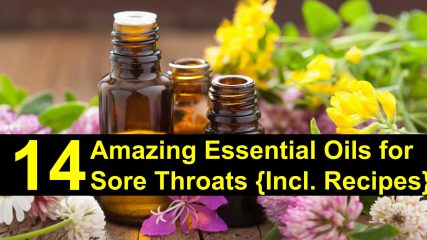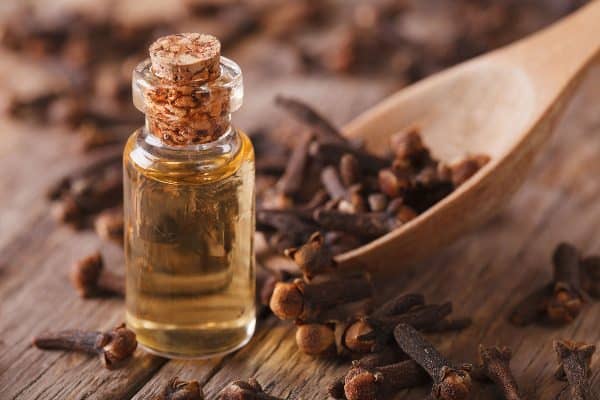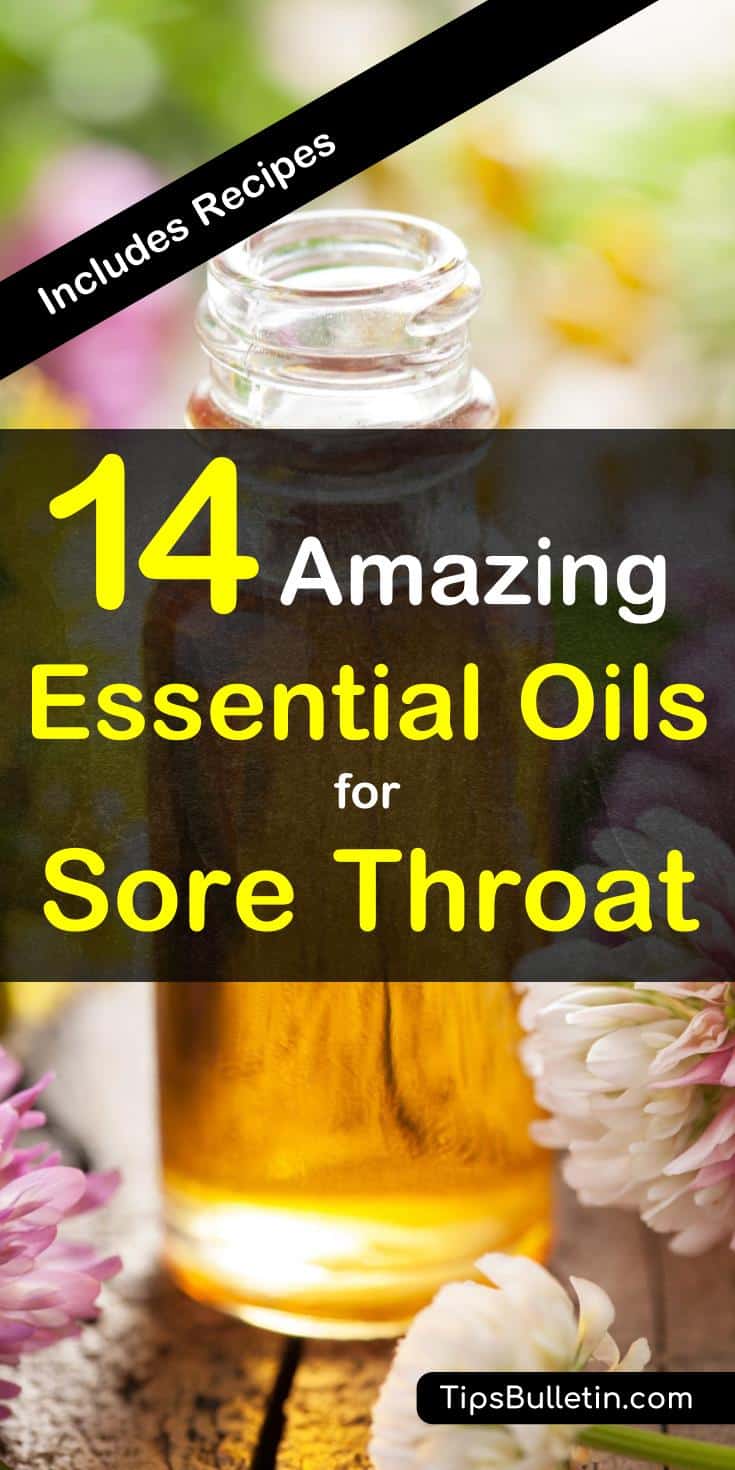By
When you have a sore throat, your first inclination is to rush to the doctor for antibiotics. But unless Strep bacteria causes a sore throat, antibiotics can do more harm than good. One of the best remedies for a sore throat is essential oils, but many people don’t know how to use them. I’ve put together this article to help you find the best essential oils for sore throats, essential oils for strep throat, essential oils for cold and cough, and to guide you in how to use them.
 By using essential oils for your sore throat, you boost your immune system, kill viruses and bacteria, prevent the spread of illness to other family members. Essential oils relieve the pain and inflammation caused by the infection and put you on the path to good health, which is why essential oils work.
By using essential oils for your sore throat, you boost your immune system, kill viruses and bacteria, prevent the spread of illness to other family members. Essential oils relieve the pain and inflammation caused by the infection and put you on the path to good health, which is why essential oils work.
Page Contents
The Best Essential Oils for a Sore Throat
While in a very succesful post here on tipsbulletin, we focused on how to get rid of a sore throat, this a article is specifically about what essential oils to best use for sore throat.
These essential oils are good for a sore throat from any cause. They are effective against both viruses and bacteria, and they help relieve other symptoms that accompany a sore throat. This list also includes essential oils for cold and cough.
 Juniper Berry Oil for a Sore Throat
Juniper Berry Oil for a Sore Throat
Juniper berry essential oil is a natural remedy for sore throats and respiratory infections, as it contains antioxidants, antibacterials, and antifungals that fight infection.
Inhale juniper berry through aroma therapy methods, apply diluted juniper berry oil directly to the skin, or take high-quality oil by mouth. Always use juniper berry in low concentrations.
Do not take it if you are pregnant, trying to get pregnant or if you have kidney problems.
Look for juniper berry oil or juniper berry essential oil, rather than juniper essential oil. Juniper essential oil is steam-distilled from juniper tree parts including the needles, twigs, wood, and berries. Juniper berry oil is distilled exclusively from the berries and is superior in quality. Expect thin, light-colored oil with a fresh, slightly woody fragrance. (..)
Peppermint Oil for Sore Throats
Peppermint oil is helpful for the treatment of sore throats, sinus infections, cold sores, respiratory infections and inflammations of the throat. Menthol, an active ingredient in peppermint oil, cools and soothes the throat, calms inflammation and breaks up mucus. Peppermint oil also has antioxidants, antimicrobial effects, and decongestant properties
that help heal your throat.
Essential Oils for Sore Throat
Preliminary research indicates that peppermint essential oil is effective in calming a sore throat. While further research is still needed, peppermint oil appears to be a beneficial addition to your sore throat tea or another remedy.
Use peppermint oil in a variety of ways:
- Mix peppermint essential oil with a carrier oil and rub on the skin of the throat and chest
- Add peppermint oil to a vaporizer for aromatherapy
- Add peppermint oil to a soothing tea (See our recipes below)
Thyme Oil
Thyme is a culinary herb with medicinal properties as well. It contains helpful chemicals that help relieve bacterial infections and throat irritations. It can also soothe muscle spasms such as coughing. For best results, use in combination with other essential oils. Thyme oil, diluted with a carrier oil, can be taken by mouth, applied to the skin of the neck and chest for hoarseness, laryngitis, swollen tonsils, sore throat, and coughing, or inhaled through aromatherapy. Thyme oil kills germs and is an ingredient in mouthwashes for sore throats.
Thyme Oil for Coughing and Colds
Some research suggests that thyme oil, in combination with other herbal supplements improves bronchitis, coughing, and the mucus production that causes a sore throat in patients with these symptoms. It reduces coughing associated with bronchitis, the common cold, and upper respiratory tract infections.
For more information on how to use thyme oil for sore throats, coughs, and colds, see the recipes and information below.
Lemon Essential Oil
Lemon oil comes from the skin of the lemon and has antibacterial properties. It is also high in vitamin C and anti-inflammatory. It soothes the throat by keeping it moist by causing an increase in saliva and kills surface bacteria. Lemon essential oil is an excellent oil for aromatherapy, as a gargle ingredient, and for an addition to tea.
Sage Essential Oil
Sage has antiseptic, antibacterial and astringent qualities that allow it to be beneficial for sore throats and coughs. Use sage oil in a diffuser for aromatherapy, as a gargle, or in a throat spray. Also, see our recipe for sage tea below. Avoid sage oil if pregnant or breastfeeding.
Sage is an approved food for use as a spice or seasoning. However large amounts of the oil can cause problems including rapid heart rate, seizures, and kidney damage. According to the NIH, sage oil spray is an effective treatment for a sore throat, but 12 drops or more of the essential oil is considered a toxic dose. Always dilute the sage oil with a carrier oil and use it in small concentrations. (..)
Eucalyptus Oil
Eucalyptus is an antimicrobial agent that acts to prevent the spread of infection in the upper respiratory tract. It also relieves pain and stimulates the immune response.
Eucalyptus works to break up mucus and phlegm and reduce congestion. It is useful for colds, flu, allergies and other causes of a sore throat.
Careful with Eucalyptus Oil
Avoid using eucalyptus oil if you are pregnant or breastfeeding, and do not use it on a child under two years old.
Here are the best ways to use eucalyptus oil for a sore throat:
- Add 1-2 drops of eucalyptus oil to your steam humidifier or the bath water
- Add a drop of eucalyptus oil to a spoonful of carrier oil such as almond oil, coconut oil, or olive oil. Massage the oil into the throat above the lymph nodes and down the sides of the throat and onto the chest
- Add 1-2 drops of eucalyptus oil to 1 cup of water and use as a gargle, do not swallow
- Use eucalyptus throat lozenges
- Do not take eucalyptus oil internally unless instructed to by your doctor
Oregano Essential Oil
Oil of Oregano is a smart choice for a sore throat from any cause. It is useful against both viruses and bacteria and also has antifungal properties. It has been shown to be effective against antibiotic resistant bacteria such as MRSA.
You can purchase Oil of Oregano in soft-gels, or you can make your own. Undiluted oregano oil is too strong and can burn, so dilute it before use. Try these methods of taking oregano essential oil:
- Add 1-2 drops of oregano oil to a gelatin capsule and fill it with a food safe carrier oil such as almond oil, coconut oil, or olive oil
- Mix 1-2 drops of oregano oil in a teaspoon of carrier oil and take by mouth. It will burn a little, but the burn quickly dissipates.
- Take oregano oil with food 2-3 times daily for 5 to 7 days.
Clove Oil for Sore Throats
 Clove oil has analgesic properties. It numbs the area of contact and relieves pain quickly. But it is strong, so a very little goes a long way. In addition to its analgesic properties, it is an antiseptic, antibacterial, antifungal, and antiviral. It is a powerful antioxidant with an ORAC value of 10,786,875 µ TE/100 GMS. It is also an anti-inflammatory and an immune stimulant.
Clove oil has analgesic properties. It numbs the area of contact and relieves pain quickly. But it is strong, so a very little goes a long way. In addition to its analgesic properties, it is an antiseptic, antibacterial, antifungal, and antiviral. It is a powerful antioxidant with an ORAC value of 10,786,875 µ TE/100 GMS. It is also an anti-inflammatory and an immune stimulant.
Clove oil can be an irritant when used at full strength, so always dilute it with a carrier oil before use.
Clove also affects the uterus and should not be used by women who are pregnant or trying to become pregnant.
Hyssop Oil
Hyssop is an ancient herb, used to treat infections, including the plague. It exhibits antibacterial and antifungal activity against common pathogens. It has strong antiviral properties, and since a virus causes most sore throats, hyssop should be one of your go-to treatments for a sore throat.
Pinene and monoterpene, found in hyssop oil, act as decongestants to loosen mucus and treat diseases of the respiratory system. If respiratory symptoms accompany your sore throat, place two drops of hyssop oil in your vaporizer or diffuser and breathe in the vapors.
Like all essential oils, use Hyssop oil in moderation with the guidance of an experienced aromatherapy expert or a natural holistic practitioner.
Frankincense Essential Oil
People have used frankincense throughout history for its health benefits. Its effectiveness in healing a sore throat is due to its antiseptic, disinfectant, and astringent properties. It acts as a general tonic, boosting the immune system and improving the general health of the body. It is also soothing for coughs and loosens phlegm in the respiratory tract. Frankincense essential oil is effective against bronchitis, nasal congestion, sore throat, and laryngitis. Its anti-inflammatory properties calm inflammation, open breathing passages, and helps relieve pain.
Place 2 to 3 drops of frankincense in a diffuser or vaporizer. Inhale the vapors to open breathing passages and calm a sore throat.
Thieves Oil for Sore Throats
Thieves oil is a mixture of essential oils that complement each other and boost their healing effects. The formula includes clove oil, lemon oil, cinnamon oil, eucalyptus oil, and rosemary oil. The blend has antiseptic, antibiotic, and antiviral
properties.
Thieves Oil – Fantastic Oil for Sore Throat
The combination of essential oils in Thieves oil supports the immune system and supports healthy lung and sinus function. It also relieves pain, reduces inflammation, and treats the underlying virus or bacterial infection causing the sore throat.
Diffuse Thieves oil in a diffuser or vaporizer three times a day. Inhaling the essential oils will help your sore throat and prevent it from spreading to other family members.
Basil Oil for Sore Throat
Basil essential oil has anti-inflammatory and antibacterial properties, and it’s a powerful adaptogen that helps the body fight disease. Use it to decrease inflammation in sore throats and sinus tracts. It works to remove viruses and bacteria from the body and prevent their growth.
To use basil oil for a sore throat:
- Add a drop of basil oil to soup or salad dressing.
- Dilute basil oil with an equal amount of coconut oil and apply topically to your chest, neck, and temples.
Rosemary Essential Oil
Rosemary oil is effective against bacteria and virus infections, making it a fantastic choice for treatment of a sore throat. It is also used to treat respiratory diseases such as bronchitis, sinus infections, asthma, and whooping cough. Use Rosemary oil in a diffuser or add a drop to food. (..)
Coconut Oil for a Sore Throat
Coconut oil is an ideal carrier oil for your essential oil remedy because it has healing properties of its own. It contains antioxidants that stimulate tissue repair. Coconut oil works with your essential oil to speed recovery, decrease inflammation, and relieve pain.
>> Related: Coconut Oil vs MCT Oil – Which is better?
Essential Oils for Cold and Cough
Many of the essential oils you’d use to treat a sore throat double as fantastic treatments for cold and cough, too. Lemon, for example, contains many antibacterial and anti-inflammatory properties, making lemon juice an excellent addition to essential oils for cold and cough. Frankincense is one of the best oils around for clearing your lungs and sinuses and regulating your breathing patterns. In its vaporized form, frankincense can go a long way toward clearing phlegm from your lungs.
If you’re familiar with cough syrups, you’ve probably noticed that many of them contain peppermint. Manufacturers include peppermint because it not only tastes good, but it’s an effective cough suppressant.
Oils For Cold and Cought
Peppermint has antispasmodic properties, meaning that peppermint can relieve the involuntary spasms of muscles (which is what happens when you cough). Add peppermint to your collection of essential oils for cold and cough.
Finally, eucalyptus oil can reduce inflammation in the respiratory system and loosen phlegm, on top of improving circulation in the respiratory system as well as stimulate the immune system (which will help you recover from the illness quicker).
The Best Essential Oils for Strep Throat
Unlike most sore throats, strep throat is caused by a bacterial infection. These essential oils are the most potent for bacterial infections, including strep throat. For more information about each oil, see the listing above:
- Oregano Essential Oil
- Juniper Berry Oil
- Sage Essential Oil
- Clove Oil
- Rosemary Oil
Causes of a Sore Throat
Inflammation at the back of the throat causes sore throats. It may be the first sign of an impending illness such as:
- Cold or flu
- Laryngitis
- Acid reflux
- Strep throat
- Allergies / sinusitis / postnasal drip
- Other common illnesses
Most sore throats are viral and accompany symptoms such as a runny nose, cough, and congestion, but little or no fever. Sore throats accompanied by a fever of 101 or higher for more than three days is usually strep throat, which is a bacterial infection.
Natural Treatments for a Sore Throat
 Antibiotics will not help sore throats caused by a virus, and overuse of antibiotics may strengthen bacteria and allow them
Antibiotics will not help sore throats caused by a virus, and overuse of antibiotics may strengthen bacteria and allow them
to become antibiotic resistant. Unless you have a fever of 101 or higher, use natural treatments to soothe your sore throat.
- Gargle with warm salt water or one of our essential oil gargles
- Use essential oil to relieve infection and soothe your throat
- Use a cool-mist vaporizer or humidifier with 2-3 drops of essential oil
- Drink cold liquids or eat a Popsicle
- Wrap your throat in a warm towel
- Buy a new toothbrush when recovering from a sore throat or other illness. No need to reinfect yourself
How to Use Essential Oils for Sore Throat
Most essential oils feature prominently in aromatherapy and topical application. Some are safe to take orally, but not all. Before you consider taking an essential oil orally, make sure that you have a high-quality oil approved for oral use. Here
are the best ways to use essential oils for a sore throat:
Aromatherapy
Aromatherapy is especially useful for treating and preventing the colds, flu, and sore throats associated with respiratory infections.
Aromatherapy – How to use essential oils
Use essential oils in any of these ways:
- Add a few drops of the essential oil into a diffuser and diffuse for 10 minutes. Sit near the diffuser and inhale the fumes. Use three to four times a day
- Add the essential oil to a vaporizer and inhale the steam
- Sniff the oil from the bottle or a cotton ball
- Add two to three drops of essential oil to a warm bath
- Apply diluted essential oil to the chest and neck and breathe in the fumes
- Place one to two drops of diluted essential oil in your palm and rub together. Bring your hands to your nose and take slow, deep breaths, inhaling the oil
Topical Application
Essential oils are very strong and best used diluted. Some oils are diluted 1:1, while others are diluted much more, possibly one to two drops of oil in a tablespoon or more of carrier oil. Use almond oil, coconut oil, avocado oil, jojoba oil, or olive oil as a carrier oil. The combined oils can be applied topically to the affected areas.
Gargling Essential Oils
Gargling is an effective way to deliver the essential oil directly to the back of the throat.
Gargling – How to use essential oils
How to Gargle:
- Stand at the sink with a glass of your gargling solution.
- Open your mouth and take a deep breath.
- Close your throat and take a mouthful of the solution.
- Tilt your head back and gently push air out through the solution.
- Spit out the solution into the sink.
- Repeat the process until the solution is used up.
- Gargle three to four times a day until your throat heals.
Oral Use
Before taking any essential oil orally, make sure it is safe for oral use. In most cases, use oil for a limited time, with a break before resuming ingestion. Oils for ingestion must be the highest quality and safe for food use. Take essential oils by one of these methods:
- Dilute the oil and put it in a gelatin capsule
- Add a drop of essential oil to water, tea, juice, or honey
- Add a drop of essential oil to suitable food
- Place a drop of diluted oil under the tongue
What are Essential Oils?
An essential oil is the concentrated oil or extracts from a plant. They are the “essence of” the plant and contain the concentrated beneficial chemicals of the plant.
How are Essential Oils Made?
High-quality essential oils are usually extracted by distillation or by the use of steam. Occasionally, manufacturers will press oils. Essential oils can also be extracted using solvents. Be careful with solvent extracted oils, as solvent residues can be present and unhealthy.
Are Essential Oils Safe?
When used according to directions, essential oils are considered safe. There is always a chance that a person could have an allergic reaction to an essential oil, so go slowly.
How Safe are Essential Oils
Pregnant and breastfeeding women should be careful when using essential oils. Pregnant or lactating women should never use some essential oils. Do not use essential oils for infants and young children without the guidance of a professional.
Always dilute essential oils. (See “How to Dilute Essential Oils” below.)
When taking essential oils internally, take one to two drops daily for two to four weeks, then take a two-week break before repeating the treatment.
How to Dilute Essential Oils
Essential oils can irritate when used at full strength. They can be diluted with a carrier oil or in a liquid. Use one of these methods to dilute essential oils:
- Mix one to three drops of essential oil into a tablespoon of carrier oil.
- For internal use: Mix one drop of essential oil into a cup of tea, juice or water, and drink.
- For topical use: Mix one drop of essential oil into your favorite lotion.
Recipes For Essential Oil Treatments for Sore Throat
Essential Oil Vapor Rub Recipe
- Virgin Coconut Oil (1/2 Cup)
- Grated Beeswax (1/8 Cup)
- Eucalyptus Oil (14 Drops)
- Peppermint Oil (14 Drops)
Essential Oil Vapor Rub Recipe
This homemade vapor rub can be used to soothe the throat and open sinus passages. Use it just like you would the commercial product. Mix in a small mason jar:
- Mix the coconut oil and beeswax in a small mason jar.
- Put one to two inches of water in a saucepan over low heat.
- Place the jar in the water.
- Allow the coconut oil and beeswax to melt, stirring to combine
- Add the eucalyptus oil and peppermint oil. Stir to combine.
- Pour the mixture into metal or glass containers.
- Allow the mixture to cool and set.
- Use as a rub on neck and chest to relieve a sore throat, cough, and congestion.
Essential Oil Cough Syrup
Essential Oil Cough Syrup
- Essential Oil Cough Syrup Recipe
- Honey (1 Tsp)
- Lemon Essential Oil (1 Drop)
- Lavender Essential Oil (1 Drop)
- Peppermint Essential Oil (1 Drop)
- Frankincense Essential Oil (1 Drop)
Mix honey, lemon essential oil, lavender essential oil, peppermint essential oil, and frankincense essential oil. The honey will help soothe your throat, while the oils fight the bacteria and inflammation, and help your throat heal.
Combining these ingredient will make one dose. Take the cough syrup two to three times daily until your sore throat heals. The immune-system-boosting qualities of the recipe make it great for a sore throat on its own, or you can use it if you have the flu for a general remedy.
Basic Gargle Recipe for Sore Throat with Mucus
Basic Gargle Recipe
- Water (2 Cups)
- Salt (2 Tbsp)
- Cayenne Oil (around 1 Drop)
- Peppermint Essential Oil (10 Drops)
- Orange (or Lemon) Essential Oil (10 Drops)
- Thyme Essential Oil (2 Drops)
- Myrrh Essential Oil (2 Drops)
This gargle recipe is designed to inhibit the growth of bacteria, break up and remove mucus, and dry out the throat. Use it when a sore throat accompanies postnasal drip or a productive cough.
- Bring the water to a boil.
- Add the salt.
- Reduce heat and simmer until salt dissolves. Allow to cool, then add the Cayenne oil. The recommended amount is one drop, but you’ll want to use more or less depending on your tolerance.
- Add the peppermint essential oil, orange or lemon essential oil, thyme essential oil, and myrrh essential oil.
- Gargle with 1 cup of the mixture. Rinse out your mouth, then repeat with remaining cup of gargle solution.
Please avoid swallowing solution.
Oregano Essential Oil Gargle
- Mix 1 teaspoon salt in 1 cup hot water.
- Add 2-3 drops Oregano essential oil
- Use as a gargle to relieve inflammation and infection
Eucalyptus – Thyme Gargle
Eucalyptus and Thyme team up to soothe and treat a sore throat. Mix:
- 1 cup water
- 1-2 drops high-quality eucalyptus oil
- 1-2 drops of food grade thyme oil
- Gargle three times a day, until the soreness is gone
Oregano Essential Oil Spray
Mix:
- 1 ounce of carrier oil such as coconut oil, olive oil, or other food safe oil
- 2-3 drops oregano essential oil
- Spray on the back of the throat
- If it burns, add more carrier oil. Some people are more sensitive to oregano oil
Honey Lemon Tea for Sore Throat
- Dissolve one teaspoon honey in a cup of warm water
- Add two drops lemon essential oil
- Stir and sip slowly
Sore Throat Spray
- Fill a 2-ounce glass spray bottle nearly full with warm water, add:
- Clove oil (One drop)
- Cinnamon oil (One drop)
- Lemon oil (One drop)
- Oregano oil (One drop)
- Optional: add 1/2 teaspoon honey
- Shake, spray back of the throat several times a day
Sage Tea
Sage tea is good for soothing a sore throat and relieving the underlying infection. To make sage tea:
- Bring 1 cup of water to a simmer, add:
- Two tablespoons fresh sage leaves, or one tablespoon dried sage leaves
- Cover and allow to steep for 10-15 minutes
- Strain
- Add honey or lemon juice, as desired
- Drink or gargle 3 to 4 times a day to soothe and heal a sore throat
Essential oils are an effective way to treat most sore throats. Many of the oils listed above have been researched and proven effective. (Follow the links for more information on the research.)
Covering the Essentials
 I hope that you enjoyed the article and that you learned more about using essential oils to treat a sore throat. It is important to have these oils handy when illness strikes. They will soothe your throat and help you recover quickly.
I hope that you enjoyed the article and that you learned more about using essential oils to treat a sore throat. It is important to have these oils handy when illness strikes. They will soothe your throat and help you recover quickly.
In this article, you learned about essential oils for sore throats, essential oils for strep throat, and essential oils for cold and cough.
There are many other essential oils for medicinal purposes.

Please feel free to add your favorites in the comment section and to share this article to Facebook, Pinterest, and Twitter so others can benefit.
I hope that you try some of these remedies the next time a sore throat strikes. Let us know how they work for you.
Source: https://www.tipsbulletin.com/essential-oils-for-sore-throat/
Disclaimer: We at Prepare for Change (PFC) bring you information that is not offered by the mainstream news, and therefore may seem controversial. The opinions, views, statements, and/or information we present are not necessarily promoted, endorsed, espoused, or agreed to by Prepare for Change, its leadership Council, members, those who work with PFC, or those who read its content. However, they are hopefully provocative. Please use discernment! Use logical thinking, your own intuition and your own connection with Source, Spirit and Natural Laws to help you determine what is true and what is not. By sharing information and seeding dialogue, it is our goal to raise consciousness and awareness of higher truths to free us from enslavement of the matrix in this material realm.
 EN
EN FR
FR

 Juniper Berry Oil for a Sore Throat
Juniper Berry Oil for a Sore Throat
























I had been hospitalized for 4 years in a row all in the same month march, for shortness of breath. They thought it was asthma. The last time which was this year, they hospitalized me for a week. Which they ran lots of test and determined I have COPD. The symptoms I had were shortness of breath, tired, and coughing.There has been little if any progress in finding a cure or reliable treatment. I was seeking something to help regain my life to be able to do things for myself. Through my primary physician i learnt about a COPD disease herbal formula from NATURAL HERBAL GARDENS and their success rate with the treatment, i immediately started on the COPD disease herbal protocol, I am glad to report the herbal formula worked effectively and there was no side effects, I had a total decline in symptoms, the Chest tightness, shortness of breath and other symptoms stopped, my COPD disease is totally REVERSED, Here is a link to the website we ordered from naturalherbalgardens . c o m This Herbal Protocol is Incredible!!
I was diagnosed with COPD , four years ago now. I moved to USA two years ago in the hope my health would improve
and my doctor has given me Seebri Breezhaler, it’s an inhalation powder 44 micrograms. I take it once a day in the morning, but it was unable to help me breath properly. Earlier this year my sister who lives in New Delhi India Purchased COPD herbal remedy from BEST HEALTH HERBAL CENTRE and they told her that their COPD herbal remedy only takes six weeks to reverse COPD completely, which she didn’t’ believe, but she had no choice than to purchase, because she knew breathing was so difficult for me. When I received the herbal remedy, I only used it for six weeks, it was so shocking to see the outcome, I was able to breath normal, no more shortness of breath, no more dry cough, chest pressure stopped and my COPD was fully reversed.
I know is hard to believe but am a living testimony, There is no harm in trying natural herbs supplements.
What is the source of this article? I would like to go to the original. Thanks
Hello Carol, thanks for letting me know. Richard forgot to add the link of the source at the bottom of the post but I just added it.